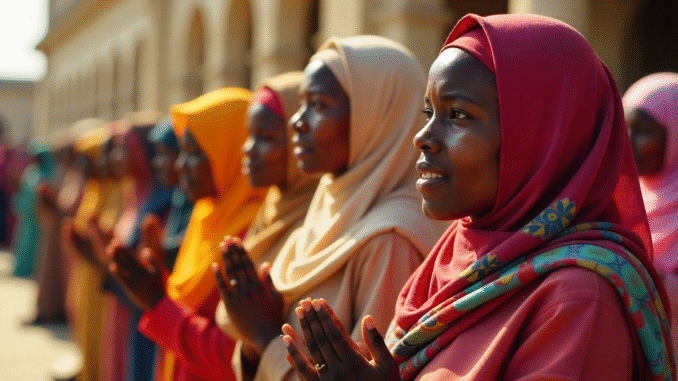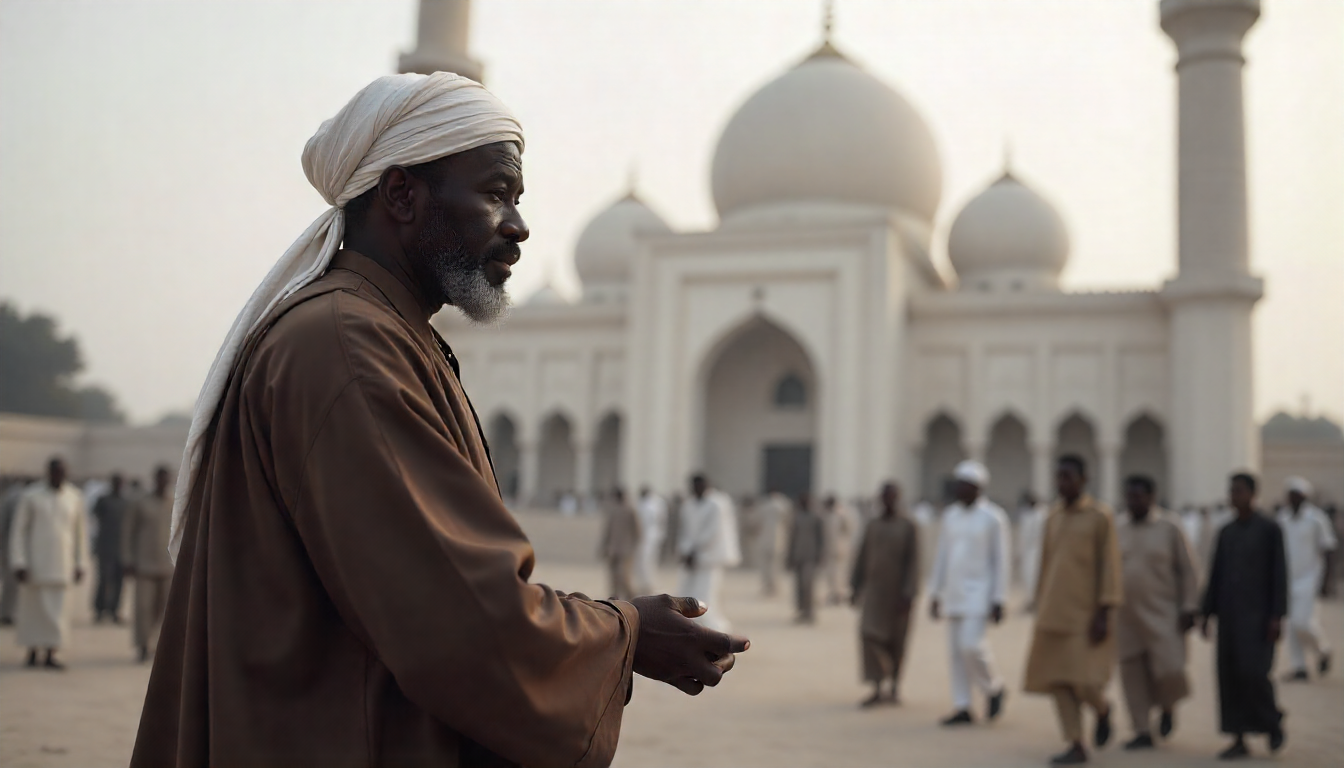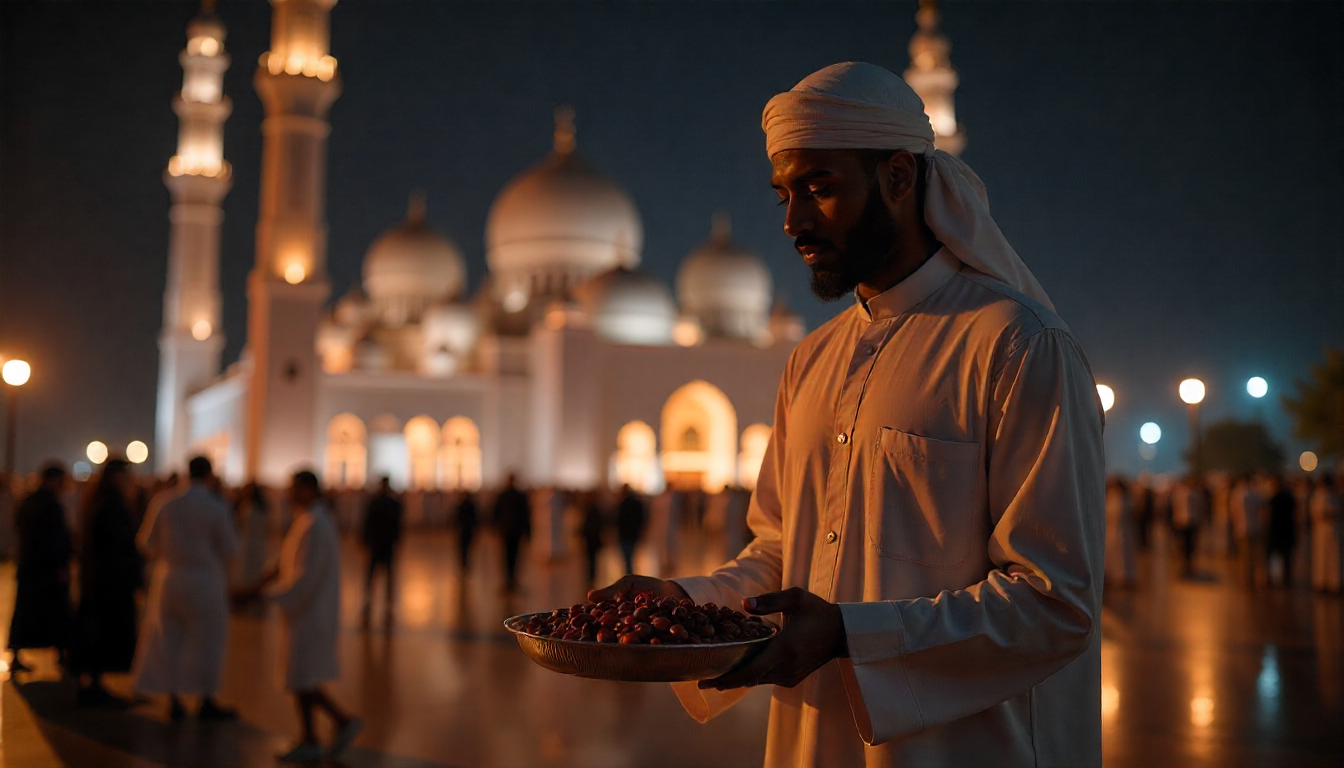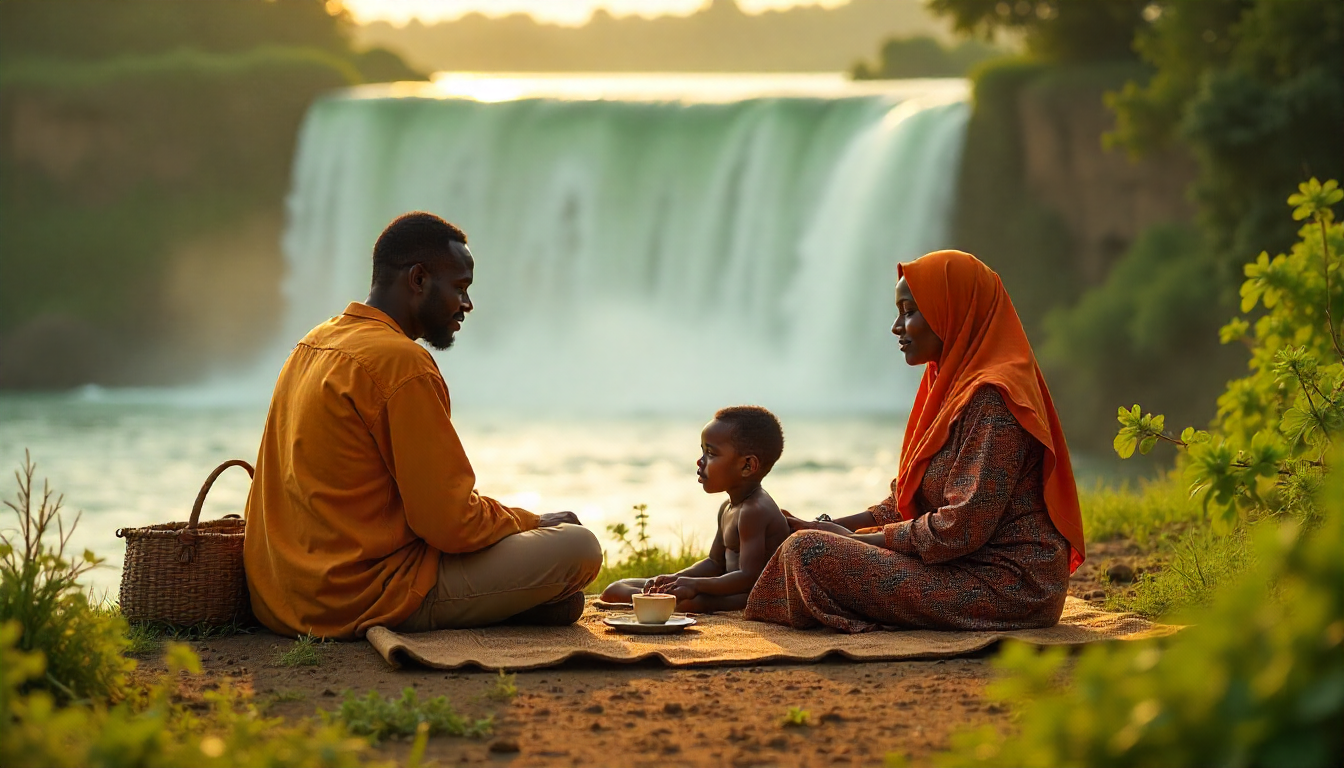
Islam is one of the main religions in Africa. It is followed by millions of people across the continent. In fact, Islam is the second-largest religion in Africa, after Christianity. In some African countries, Islam is even the most practised religion.
Islam is more than just a belief system in Africa. It is a way of life. It affects how people pray, dress, eat, marry, and do business. It also influences government, education, and culture in many parts of Africa.
The religion of Islam began in Mecca (present-day Saudi Arabia) in the 7th century, when Prophet Muhammad (peace be upon him) received a message from God (Allah). Not long after that, Islam spread to Africa. It was first introduced in North Africa, and from there it moved into West Africa, East Africa, and other regions.
Many people think that Islam came to Africa through war or force. But in most cases, Islam spread peacefully in Africa. It came through traders, teachers, missionaries, and migrants. African kings and rulers also played a significant role in spreading Islam throughout their kingdoms.
Today, Islam is strong in many African countries. In places like Egypt, Nigeria, Senegal, Mali, and Somalia, Muslims form the majority of the population. There are also millions of Muslims living in countries where Christians or other religions are in the majority.
As of 2025, it is estimated that there are over 446 million Muslims in Africa. This number is growing every year because of population growth and birth rates, especially in Muslim-majority areas. Experts say that by 2050, the Muslim population in Africa will rise even more, and Islam will continue to play a big role in African society.
In this article, we will look at:
How Islam started in Africa
How it spread across the continent
The countries in Africa with large Muslim populations
And how Islam affects life, politics, and culture in Africa today
Understanding Islam in Africa is important because it helps us know more about the history, diversity, and spiritual life of the African people. It also helps promote peace, respect, and tolerance among people of different religions.
Contents
- History of Islam in Africa
- How Did Islam Spread in Africa?
- Muslim Population in Africa (with Percentages)
- List of Islamic Countries in Africa
- Role of Islam in African Culture and Politics
- Challenges and Growth of Islam in Africa Today
Key Takeaways:
Islam came to Africa peacefully and early-starting from 615 AD.
It spread through trade, teaching, kingship, and migration.
Countries like Algeria, Egypt, Senegal, Somalia, and Nigeria have large Muslim populations.
Islam shapes culture, education, and governance in many African communities.
Muslims in Africa are part of a powerful story—past, present, and future.
History of Islam in Africa
Islam entered Africa very early—just a few years after it began in Arabia. In fact, Africa was the first place outside Arabia where Islam was practiced.
First Arrival: Hijrah to Ethiopia
In the year 615 AD, a group of early Muslims fled from Mecca to Abyssinia (modern-day Ethiopia). They were running away from persecution. The Christian king of Ethiopia welcomed them and provided them with safety. This event is known as the First Hijrah (migration), and it shows that Africa has a deep connection with Islam from the very beginning.
Islam in North Africa
After Prophet Muhammad (peace be upon him) died in 632 AD, Islam began to spread quickly. By the mid-7th century, Muslim armies and traders moved into Egypt, Libya, Tunisia, Algeria, and Morocco. These countries became some of the first Islamic regions in Africa.
Over time, the people of North Africa converted to Islam. Islamic culture, language (Arabic), and education systems became common in the region.
Spread Through Trade and Peaceful Teaching
Islam moved from North Africa to West Africa through the Trans-Saharan trade routes. Muslim traders, scholars, and teachers traveled with their religion and taught it to others. They did not force people to convert. Instead, many African kings and local leaders accepted Islam because they respected the traders and scholars.
Important empires like:
The Mali Empire (led by Mansa Musa),
The Songhai Empire, and
The Kanem-Bornu Empire
all supported Islam and helped it grow.
In West Africa, cities like Timbuktu became centers of Islamic learning. Timbuktu had many Islamic schools, libraries, and scholars who were famous across Africa and the Muslim world.
Islam in East Africa
Islam also reached East Africa, especially along the Swahili Coast—modern-day Kenya, Tanzania, and Mozambique. It came through Arab traders and sailors across the Indian Ocean. These traders settled in coastal cities and built mosques. Many locals adopted Islam through trade, marriage, and cultural exchange.
Islamic Empires in Africa
Islam didn’t just spread, it helped build empires. Some of the greatest African leaders were Muslim. They supported Islamic education, built mosques, and used Islamic law to govern.
Examples include:
Mansa Musa of Mali – known as one of the richest men in history
Usman dan Fodio – founder of the Sokoto Caliphate in present-day Nigeria
Ahmad al-Mansur – Sultan of Morocco
Summary:
Islam entered Africa as early as 615 AD
It spread through peace, trade, migration, and education
North Africa became Islamic first, followed by West and East Africa
Great African empires and scholars helped Islam grow
Islam in Africa was deeply connected to culture, learning, and leadership
How Did Islam Spread in Africa?
Islam spread across Africa in a peaceful and steady way. Unlike what many people think, it was not mostly spread by war. Instead, Islam came through trade, travel, teaching, and cultural exchange. Let’s look at the major ways Islam spread in Africa:
1. Through Trade
One of the biggest ways Islam spread in Africa was through trade.
Muslim traders from North Africa and the Middle East travelled across the Sahara Desert into West Africa. They brought goods like salt, gold, cloth, and books and along with those goods, they brought Islam.
As African people traded with Muslims, they also learned about the religion. Over time, many kings, chiefs, and local people accepted Islam because they admired the honesty and culture of the Muslim traders.
2. Through Islamic Scholars and Teachers
Islam also spread through the work of Muslim scholars (teachers). These scholars didn’t just preach—they taught people how to read and write, and they started schools known as madrasas.
Many African families sent their children to learn the Quran, Arabic, and Islamic law. This made Islam a respected religion of knowledge and education.
Cities like:
Timbuktu (in Mali)
Kano and Zaria (in Nigeria)
Fes (in Morocco)
became centers of Islamic learning.
3. Through Kings and Rulers
In many African kingdoms, when the king became a Muslim, the people followed. The religion of the ruler often became the religion of the kingdom.
For example:
In the Mali Empire, Mansa Musa was a devout Muslim. He made the famous pilgrimage (Hajj) to Mecca and built mosques along the way.
In Hausaland (Northern Nigeria), rulers like Usman dan Fodio spread Islam through leadership and teaching—not just war.
4. Through Marriage and Migration
Muslim traders and settlers often married local women, especially along the East African coast. Their children were raised as Muslims, and Islam became part of the family and community life.
Also, many Muslims migrated and settled in African towns and cities, bringing their beliefs, food, clothing, and ways of life. This helped Islam grow naturally.
5. Through Islamic Empires
Powerful Islamic empires like the:
Sokoto Caliphate (Nigeria),
Mali Empire,
Kanem-Bornu Empire, and
Fatimid Caliphate (Egypt and North Africa)
helped protect and promote Islam. These empires built mosques, schools, and courts based on Islamic law (Sharia).
Summary – Main Ways Islam Spread in Africa:
| Method | How It Helped Spread Islam |
|---|---|
| Trade | Muslims shared their religion during business |
| Teaching | Scholars opened schools and taught the Quran |
| Rulers | Kings who became Muslims influenced their people |
| Marriage | Intermarriage helped spread Islam in families |
| Empires | Islamic governments promoted Muslim culture |
Muslim Population in Africa (with Percentages)
Islam is the second-largest religion in Africa after Christianity. Millions of Muslims live across the continent in the north, west, east, and even parts of central and southern Africa.
As of 2025, it is estimated that about 42–45% of all Africans are Muslim, which means over 446 million Muslims live in Africa.
Muslim Population by Region in Africa
1. North Africa – Almost 100% Muslim
North Africa has the highest percentage of Muslims in Africa. Almost all the people in this region are Muslim.
| Country | Muslim Population (%) |
|---|---|
| Egypt | 90–94% |
| Algeria | 99% |
| Morocco | 99% |
| Tunisia | 99% |
| Libya | 97% |
| Sudan | 90% |
Most Muslims in North Africa are Sunni Muslims and follow the Maliki school of thought.
2. West Africa – Mostly Muslim
West Africa has a very large Muslim population, especially in the Sahel region. Some countries have more Muslims than others.
| Country | Muslim Population (%) |
|---|---|
| Senegal | 95% |
| Mali | 90% |
| Niger | 98% |
| Nigeria | 47% (mostly in the North) |
| Gambia | 95% |
| Guinea | 85% |
Nigeria has the largest Muslim population in West Africa by number, even though it is religiously mixed.
3. East Africa – Strong Muslim Presence
In East Africa, Islam is strong in some coastal and inland areas.
| Country | Muslim Population (%) |
|---|---|
| Somalia | 99% |
| Djibouti | 96% |
| Sudan | 90% |
| Eritrea | 50% |
| Ethiopia | 34% |
| Tanzania | 35% |
| Kenya | 11% |
Islam entered East Africa through Indian Ocean trade and Arab settlers along the Swahili Coast.
4. Central & Southern Africa – Small Muslim Minority
Islam is less common in Central and Southern Africa, but still growing in cities and among migrants.
| Country | Muslim Population (%) |
|---|---|
| Chad | 55% |
| Cameroon | 20% |
| South Africa | 1.9% |
| Democratic Republic of Congo | 10% |
Africa-Wide Summary (as of 2025)
| Region | Approx. Muslim % |
|---|---|
| North Africa | 95–99% |
| West Africa | 60–70% |
| East Africa | 30–40% |
| Central Africa | 10–20% |
| Southern Africa | 1–5% |
📌 Total Muslims in Africa: About 446 million
📌 Expected by 2050: Over 660 million Muslims, due to population growth
📌 Source: Pew Research Center – Future of World Religions
Summary:
Islam is growing fast in Africa, especially in the north and west.
Some countries are almost fully Muslim, like Somalia and Algeria.
Other countries are religiously mixed, like Nigeria and Ethiopia.
By 2050, Africa may have more Muslims than any other continent.
List of Islamic Countries in Africa
Many African countries have large Muslim populations. Some are Muslim-majority countries, while others have significant Muslim communities. Below is a list of countries in Africa where Islam is the dominant religion, or where Muslims make up the majority of the population.
Muslim-Majority Countries in Africa (Over 50%)
These countries have more than half of their population practising Islam:
| Country | % Muslim (approx.) | Notes |
|---|---|---|
| Algeria | 99% | Islam is the state religion |
| Morocco | 99% | Almost all Sunni Muslims |
| Tunisia | 99% | Strong Islamic culture and laws |
| Libya | 97% | Sunni Islam dominant |
| Egypt | 90–94% | One of the largest Muslim populations |
| Sudan | 90% | Mix of Arab and African Muslims |
| Mauritania | 99.5% | Officially an Islamic republic |
| Somalia | 99% | Follows Sunni Islam, Shafi’i school |
| Niger | 98% | Islam is widely practised in daily life |
| Mali | 90% | Islam linked to ancient empires |
| Senegal | 95% | Known for Sufi brotherhoods |
| Gambia | 95% | Majority Sunni Muslim |
| Guinea | 85% | Islam introduced via Mali empire |
| Djibouti | 96% | Islam is state religion |
| Chad | 55% | Mostly Muslim in the north |
| Comoros | 98% | Islam is official religion |
Countries with Large Muslim Minorities (30%–50%)
These countries have significant Muslim populations but not majority:
| Country | % Muslim (approx.) |
|---|---|
| Nigeria | 50% (mostly in North) |
| Ethiopia | 34% |
| Tanzania | 35% |
| Eritrea | 50% |
| Cameroon | 20% |
Notes:
In some of these countries, Islam is officially recognized as the state religion (like Mauritania, Morocco, and Libya).
Other countries have freedom of religion, where Muslims live peacefully among Christians and followers of traditional beliefs.
Summary:
North Africa is almost fully Muslim.
West Africa has many Muslim-majority countries.
East Africa has a strong Muslim presence in Somalia, Djibouti, Sudan, and parts of Kenya and Tanzania.
Central and Southern Africa have smaller Muslim communities, but they are growing.
Role of Islam in African Culture and Politics
Islam is not just a religion in Africa—it is also a strong part of African culture, tradition, and politics. From clothing to education, and even in how leaders govern, Islam has shaped many parts of African life.
1. Islam and African Culture
In many African countries, Islam has mixed with local traditions. This has created a unique Islamic-African culture that includes:
Dressing modestly: Muslim men often wear long robes, and women wear hijabs or veils in many Islamic communities.
Islamic names: Many African Muslims have Arabic names like Abdullahi, Fatima, Amina, Yusuf, Ibrahim, etc.
Daily prayers: Muslims pray five times a day. In some cities, you will hear the call to prayer (Adhan) from loudspeakers in mosques.
Mosques as centers: Mosques are not just for worship—they also serve as places for community gatherings, announcements, and learning.
Islamic festivals: Holidays like Eid-el-Fitr and Eid-el-Kabir are widely celebrated with food, prayers, and charity.
Islam has also influenced African music, art, language, and family life, especially in North and West Africa.
2. Islam and Education
Islam brought reading and writing to many African societies. Muslim scholars taught people how to read the Quran and write in Arabic.
In cities like Timbuktu (Mali) and Kano (Nigeria), Islamic education helped many Africans become teachers, judges, and writers.
Even today, many children in Muslim areas attend Islamic schools (madrasas) before going to regular school.
3. Islam and African Politics
Islam also plays a big role in government and law in some African countries.
In Northern Nigeria, Sharia law is used for Muslims in areas like marriage, business, and crime.
In countries like Sudan, Mauritania, and Somalia, Islam is the state religion and influences the laws.
Some African leaders, like Mansa Musa of Mali and Usman dan Fodio of Nigeria, used Islamic teachings to rule justly.
Even in democratic countries, Muslim leaders often speak about peace, honesty, and justice based on Islamic values.
4. Islam and Peaceful Coexistence
In many African communities, Muslims live peacefully with Christians and followers of traditional religions. They marry each other, celebrate together, and help each other in times of need.
In countries like Nigeria, Ghana, and Kenya, Muslims and Christians often share markets, schools, and neighbourhoods.
However, in some areas, there have been conflicts—not just because of religion, but also due to politics, land disputes, and ethnicity. Leaders and religious groups continue to promote peace and unity.
Summary:
Islam influences how Africans dress, learn, celebrate, and govern.
It plays a big role in education, laws, and community life.
Many African countries use Islamic values to guide leadership and justice.
Muslims and non-Muslims often live together peacefully but continued efforts are needed to maintain peace.
Challenges and Growth of Islam in Africa Today
Islam continues to grow in Africa, both in numbers and in cultural influence. But like every religion, it also faces challenges—social, political, and economic. In this section, we’ll look at both the current challenges and the positive growth of Islam across the continent.
Current Challenges Facing Islam in Africa
1. Misunderstanding and Extremism
One of the biggest challenges is the rise of extremist groups in some parts of Africa. Groups like Boko Haram (in Nigeria) and Al-Shabaab (in Somalia) claim to be fighting for Islam, but their actions are against the peaceful teachings of the religion. This causes fear and gives people the wrong image of Muslims.
Many African Muslims, scholars, and leaders are working hard to promote true Islamic values of peace, justice, and mercy.
2. Religious Conflicts
In some areas, there are religious tensions between Muslims and Christians. These are often caused by politics, land issues, or poverty, not religion itself. Unfortunately, religion is sometimes used to divide people instead of bringing peace.
3. Poverty and Lack of Education
In many Muslim-majority communities, especially in rural areas, people face poverty, unemployment, and a lack of access to quality education. This makes it harder to build strong Islamic institutions and schools, and it sometimes leads youth into crime or radical ideas.
Positive Growth and Opportunities
1. Rising Muslim Population
The Muslim population in Africa is growing fast. As of 2024, there are about 446 million Muslims in Africa. By 2050, this number is expected to reach over 660 million. This means Islam will continue to have a strong influence in Africa’s future.
2. More Islamic Schools and Universities
There is a growing number of Islamic schools, universities, and research centers in Africa. These institutions teach both religious and modern education, helping Muslim youth grow in knowledge and character.
Famous institutions include:
Al-Azhar branches in Africa
International Islamic University in Uganda
Islamic universities in Sudan, Nigeria, and Morocco
3. Peace Movements and Interfaith Dialogue
Muslim leaders in Africa are taking part in peace talks and interfaith programs. In countries like Kenya, Ghana, and Nigeria, Muslims and Christians meet to promote unity and respect.
This shows that religion can be a tool for peace, not conflict.
4. Strong Muslim Communities in Cities
In African cities like Lagos, Dakar, Cairo, and Khartoum, Muslims are active in business, education, charity, and politics. They run hospitals, orphanages, schools, and food banks. The zakat system (charity) is helping many poor families.
Summary:
Islam in Africa is growing fast, but faces some challenges like extremism, poverty, and religious tension.
At the same time, Islam is also growing in education, peace efforts, and population.
African Muslims are working hard to build a better future while staying true to their faith.
Conclusion: The Past, Present, and Future of Islam in Africa
Islam has a deep and rich history in Africa. It arrived in Africa just a few years after it began, and it quickly became part of African life. From the deserts of North Africa to the forests of West Africa and the coasts of East Africa, Islam grew through peace, trade, scholarship, and community.
Today, Islam is one of the most widely practised religions in Africa, with over 446 million Muslims. In many African countries, it plays an important role in culture, education, law, and leadership.
Though Islam faces some challenges, such as extremism, poverty, and religious conflict, it also has many strengths. The religion continues to grow in population, learning, and social impact. In many places, Muslims are leading the way in business, charity, interfaith peace, and education.
The future of Islam in Africa looks strong. By 2050, the continent may become one of the regions with the largest Muslim population in the world. But with that growth comes the need for peaceful understanding, unity, and true Islamic values like justice, kindness, and knowledge.
- Follow me on TikTok for quick tips and behind-the-scenes tours
- Subscribe to my YouTube channel for in-depth videos and property showcases
- Follow me on Facebook for updates, listings, and real estate advice





Leave a Reply